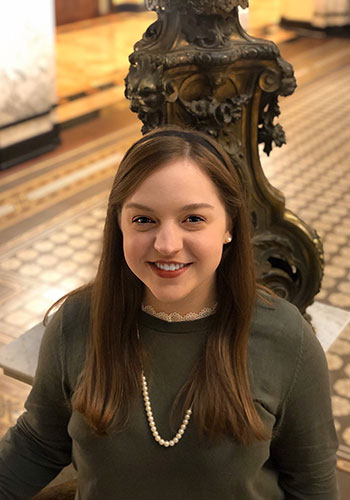Psychology PhD Student Creates COVID-19 Resource List
April 7, 2020
As the ripple effects of the COVID-19 pandemic continued to spread, clinical psychology PhD student Kelsey Clark was inspired by her training as both a scientist and a clinical practitioner to do something. She created the COIVD-19 Resource List — now stretching over 400 items long — to connect the public with a range of resources, with a focus on mental health. Since sharing the list on her Twitter account, @KelseyEClark, Clark has been invited to join forces with the group Psychologists Against COVID-19.

What inspired you to start your COVID-19 Resource List?
As social distancing became more widespread, various psychology-related professional organizations of which I am a member began distributing helpful content related to telehealth and remote therapy. Additionally, I started seeing social media and listserv posts with resources I wanted to recommend to my psychotherapy patients. I initially shared links here and there with my research lab and my clinical practicum site, but soon realized these resources would be useful to many people, so I began keeping a list and ultimately made it publicly available.
What types of resources are included in your list? How did you choose the type of resources to highlight?
The list includes resources related to mental health self-care, seeking help, serving others, at-home activities, remote work/education, and supporting mental health/healthcare providers. So the list has everything from coping skills and guided meditations, to food bank listings and volunteer opportunities, to online course materials and yoga videos!
Given my field of study, I highlighted mental health resources. This pandemic will have a major impact on everyone's mental well-being. There is particular need for supporting people living with mental illness, marginalized and vulnerable community members, and employees working in essential services such as healthcare. As such, the list emphasizes resources intended for these individuals.
How are you going about creating the list?
I am keeping an eye out for resources as I read the news, scroll through my social media feeds, and check my email. It has been encouraging to see how many resources are out there, and how many people are doing what they can to help during this difficult time. I have observed this to be especially true for the scientific and mental health/healthcare communities; there is a constant flow of helpful resources being made available.
How is this project related to your academic work or field of study?
My education through Drexel's doctoral program in clinical psychology emphasizes being both a scientist and a clinical practitioner. As such, I feel it's my responsibility to do what I can to help others in this hectic and distressing time. I see the COVID-19 Resource List as one way to help by curating and disseminating evidence-based information and encouraging mental health care. This moment in history is having a significant impact on everyone's psychological well-being, so the more these resources are shared, the better. Importantly, this is also true for myself and my colleagues as mental health clinicians, and especially for medical healthcare workers. We have to provide care for the care providers, too!
Do you have future plans for your list?
An exciting update is that this list has led to me joining a group called Psychologists Against COVID-19. I'm working with over 100 psychologists from around the country on various initiatives, including creating a central place for these pandemic-related resources! I will announce any news related to this on my professional Twitter account (@KelseyEClark).
Anything else you’d like to share with the Drexel CoAS community?
It's important to acknowledge that this is a very difficult time for everyone. We are all experiencing stress, discomfort and suffering due to the ripple effect of this pandemic. May we all be kind and compassionate towards ourselves as we experience these difficulties.
I encourage members of the community to use mental health resources such as those on the list. For people who are managing mental illness, this is not the time to put off treatment. Many mental health providers are still conducting sessions via video. My research lab, the Drexel Center for Weight, Eating, and Lifestyle Science (WELL Center) is running a number of clinical trials, most notably treatments for eating disorders. This is a time of acute distress for many with eating disorders due to various pandemic-related challenges, so we are continuing remote treatment for our study patients. More information is available on our website.
Access the COVID-19 Resource List